How I Healed My Mother’s Skin Cancer At Home
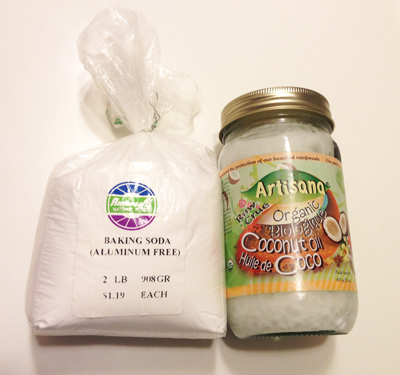
For the last 3 years, my mother had been suffering with a type of skin cancer called Basal Cell Carcinoma. This is the less aggressive form of skin cancer, deemed as non-life threatening by the medical industry, in contrast to the more malignant form of skin cancer known as Melanoma.
The basal cell first began as a small red lesion on the crown of my mother’s head. It would start to bleed, then scab, then bleed again and then scab more.
The scab continued to grow and over the course of 3 years it nearly quadrupled in size. Not only did it grow wider, but it grew higher as well. Unfortunately, it took this long before my mother finally decided to go to the doctor.
She was referred to a Dermatologist by her
GP. A biopsy was done and the lesion was confirmed as cancerous. At the
initial consultation the Dermatologist said what every doctor says: “There
is no cure for Basal Cell Carcinoma, but we can surgically remove it.”
He couldn’t guarantee that it wouldn’t return. Regardless, she scheduled an
appointment to have it removed.
Not too long after the surgery, the basal
cell returned – this time with a vengeance. It seemed to grow much quicker,
and within two weeks after the surgery the bleeding and scabbing was back
again. It was extremely frustrating to witness this, and I truly felt
powerless over the matter. I made the decision to go to the Dermatologist
with my mother on her next visit, and I was prepared to ask him a plethora
of questions, my first question being, “What the heck is this thing???”
That is when I learned the medical term for this type of skin cancer.
Taking
Matters Into Our Own Hands
Equipped with the term ‘Basal Cell Carcinoma’ and Google, I researched everything I could about it, including natural treatments. I recalled reading some articles about how sodium bicarbonate, or baking soda, has a high success rate with various types of cancers, so I looked into the topical use of baking soda on basal cells. Surprisingly, I found quite a few personal testimonies from people who had healed a basal cell completely, using just baking soda and water. Cancer cannot thrive in an alkaline environment. And that’s exactly what baking soda produces.
My mother had the basal cell removed surgically twice more before she finally let me try the baking soda treatment. And 5 weeks ago is when this treatment began.
I modified the concoction by using coconut oil instead of water, as raw organic coconut oil helps in the regeneration of skin cells. I mixed one part baking soda and one part coconut oil (a teaspoon of each) in a shot glass and stirred it up until it became a malleable paste, which is what I applied to the affected area. The results were truly astonishing.
Please keep in mind that starting at an early age my mother began to experience hair loss. However, as a result of less hair it was much easier to apply the treatment, and the effect of the treatment was more visible.
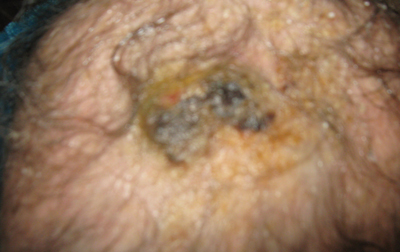
1) February 13 – Day 1.
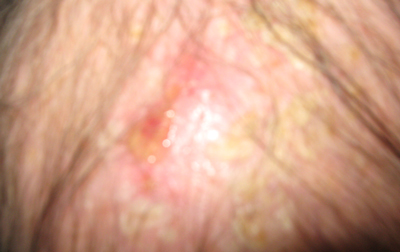
2) February 17 – Day 5
1) Feb 13 – Day 1:
On the first night after 2 applications during that day, the entire scab
fell off on its own. The area was very tender, and the basal cell was
revealed as a fleshy bulb of skin that would easily bleed when even minimal
pressure was applied.
2) Feb 17 – Day 5: The
basal cell started to shrink in size. The area around where the scab had
been was all flaking, but the coconut oil was helping to clear all the dead
skin away.
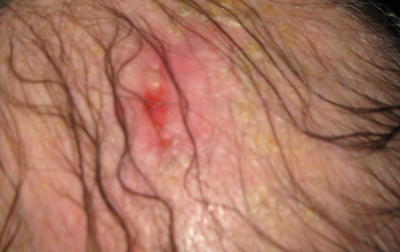
3) February 18 – Day 6
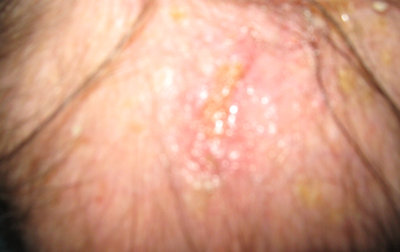
4) February 23 – Day 11
3) Feb 18 – Day 6:
The basal cell had completely disappeared, and there was no more bleeding.
4) Feb 23 – Day 11: The
skin where the basal cell had been was very tender, so we applied Polysporin
at night to allow for healing and prevent infection.
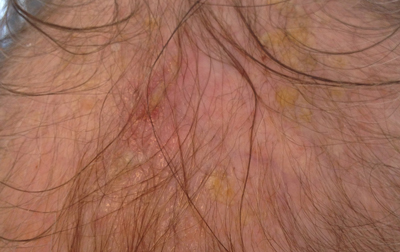
5) February 26 – Day 14

6) March 2 – Day 18
5)Feb 26 – Day 14:
The open wound where the basal cell had been was starting to get smaller.
6) March 2 - Day 18:
The affected area began patching itself up, closing up the wound. The area
was still very tender and sore, so we stopped using the baking soda and
coconut oil and applied Polysporin instead.

7) March 6 – Day 22

8) March 22 – Day 38
7)
Mar 6 – Day 22: The wound had closed up entirely. We
thoroughly cleaned the area and gently picked away all the left over dead
skin.
8) March 6 –
present: The skin surface has remained clear of the basal cell. For
now I am still continuing to apply the baking soda and coconut oil EVERYDAY,
along with apple cider vinegar soaked cotton pads that I place over the area
to reach the basal cell root. My mother will be scheduling regular follow
ups with her doctor, as well as another biopsy.
The Method I Used
- Raw organic coconut oil (the brand I used
was Artisana)
- Aluminum-free baking soda (I purchased it at a holistic health food store)
- A shot glass, to effectively stir the mixture within
- Something to stir the mixture with, I used the narrow handle of a small
metal spoon.
- Polysporin Triple 3 Antibiotics, or any other antibiotic ointment to apply
at night
I stirred 1 part baking soda and 1 part coconut oil in a shot glass until it became a malleable paste that was easy to apply. It helped to apply a bit of warmth to melt the coconut oil faster – I let the shot glass run under hot water for a bit.
Using the handle of the spoon that I stirred with, I applied the mixture to the affected area. I DID NOT RUB IT IN. Instead I gently slathered the area with the paste and let it remain there for as long as possible. Then I applied a shower cap to keep the treatment in place.
I aimed for 3 applications a day for the first week, and 2 for the second week moving forward, and made sure to properly clean the affected area before each application.
A basal cell has roots that reach much deeper into the skin than it appears, it is not just on the surface, therefor I learned that it is important to continue using the treatment much longer, even when the skin has fully patched up.
What We All Learned From This Experience
Looking back at the start of this whole experience, I realize that I was just as skeptical as most people with regards to a successful treatment that costs only a few dollars, not to mention one that is sitting in my kitchen pantry! I completely understand why a simple solution like baking soda and coconut oil would be cast aside in favor of a more ‘sophisticated’ treatment.
While I am by no means completely against
mainstream or allopathic medicine, it is my opinion that we have been
heavily conditioned by the medical industry to believe that we have
absolutely no power over our own physical and mental health, and that the
solutions and cures to our ailments lie far beyond our reach; that only a
large sum of money can buy a cure.
I can’t stress enough that this is simply not true.
Throughout the progress of my mother’s healing, my whole family had experienced first hand how effective an alternative treatment can be. Not only is it effective – it is affordable, safe, and free of side-effects. Needless to say, my family’s opinion on mainstream/allopathic medicine has shifted significantly.
My hope is that people who are going through a similar experience can come to understand the power is in their hands to heal themselves. No one is going to spoon-feed us the truth about how we can heal using simple and affordable methods – especially not the medical industry. We must do our own research and reclaim our healing power.
Blessings, namaste and much love,
Kyneret